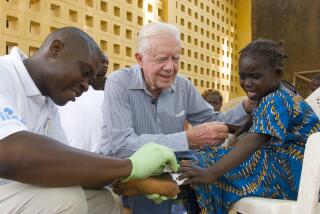Clinton’s AIDS Speech Draws Cheers, Jeer
- Share via
WASHINGTON — President Clinton, heckled by an AIDS activist but cheered by AIDS patients at a local hospital, said Wednesday in observance of World AIDS Day that the United States must accelerate its efforts to find better treatments and an eventual cure for the disease.
“I think we have done a good job in the first year of this Administration if you measure ‘good job’ in terms of organizing ourselves properly, funding the effort more adequately, identifying some of the major problems in the bureaucracy and going after them,” he told doctors and staff members at Georgetown University Medical Center.
But he added that journalist Jeffrey Schmalz, who died only days ago from complications of AIDS, was right to rebuke him in a New York Times Magazine article for failing to do more.
“I invite you to tell me what else you think I can do and to ask yourselves what else you can do,” he said.
The remarks were part of a government-wide observance of World AIDS Day--first designated by the United Nations in 1988.
As the President visited an AIDS ward at the medical center, issued a proclamation and later addressed several hundred staff members at the hospital, members of his Cabinet fanned out to participate in a host of other events.
The level of activity--which contrasted sharply with that of the Ronald Reagan and George Bush administrations--appeared designed at least in part to demonstrate the Clinton Administration’s commitment to the search for an AIDS cure and to reassure skeptics in the AIDS community that the issue remains an urgent one for the White House.
Recently, some activists have expressed disappointment at the Administration’s level of attention to the war against AIDS as well as fears that concern over the epidemic is receding from America’s consciousness.
They contend that even in the gay community, hardest hit by AIDS, many have become discouraged by the lack of progress against the epidemic and may have lost their passion for the fight.
Since the disease was first recognized in 1981, more than 200,000 people have died from AIDS in the United States.
Hours before the President’s hospital visit, Health and Human Services Secretary Donna Shalala and Surgeon General Joycelyn Elders served a sausage-and-eggs breakfast to homeless people with AIDS at a shelter in the District of Columbia.
“I understand people’s pain,” Shalala told a demonstrator from the activist group ACT UP, who shouted “Where’s the beef?” to make his point that the Administration had done too little to help AIDS sufferers.
“This Administration has taken extraordinary steps compared to the last 12 years,” she said.
She said the White House has persuaded Congress to approve a 21% increase in funds to combat AIDS, appointed an AIDS coordinator and announced formation of a task force to speed up research into treatments and a cure.
The Administration has budgeted about $1.3 billion for AIDS research and treatment, compared to the Bush Administration’s $1.07 billion.
At the hospital, Clinton greeted seven AIDS patients, including Larry Singletary, 38, who shook the President’s hand and said: “I hope you appropriate lots of money so that research can be done.”
In the midst of the President’s remarks, a 19-year-old heckler approached him, shouting: “Talk is cheap and we need action!” Calling Clinton “Slick Willie,” a name Republicans tried to pin on him during last year’s election campaign, the heckler continued: “The Republicans were right! We should have never trusted you! You are doing nothing while we die!”
Clinton, appearing unruffled by the disturbance, responded: “That’s OK. It’s all right. I don’t take it personally. . . . I’d rather have that man in here screaming at me than have him give up altogether.”
“We love what you’re doing!” AIDS activist Elizabeth Glaser called to the President from a front-row seat. Glaser, an HIV-positive mother who lost a child to AIDS, is the wife of actor-director Paul Michael Glaser.
Times staff writer Ronald J. Ostrow contributed to this story.
More to Read
Sign up for Essential California
The most important California stories and recommendations in your inbox every morning.
You may occasionally receive promotional content from the Los Angeles Times.













